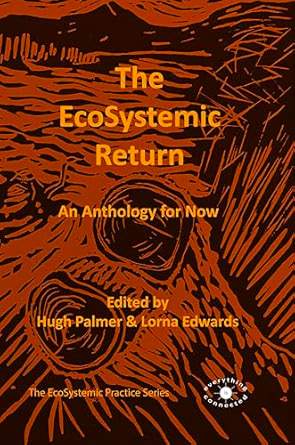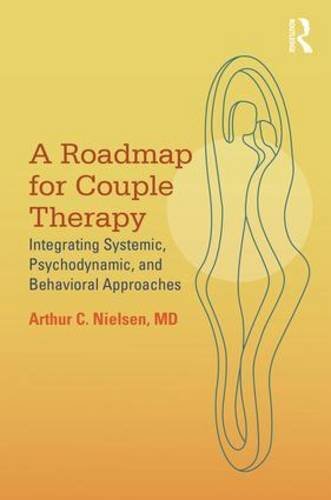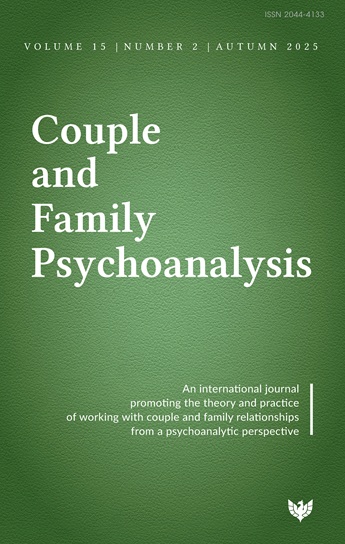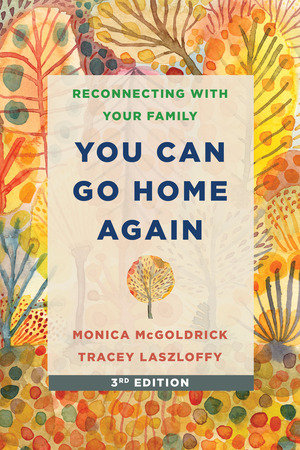The EcoSystemic Return: An Anthology for Now

Book Details
- Publisher : Everything is Connected Press
- Published : May 2025
- Cover : Paperback
- Pages : 335
- Category :
Family, Couple and Systemic Therapy - Catalogue No : 98181
- ISBN 13 : 9781739773342
- ISBN 10 : 1739773349
There are currently no reviews
Be the first to review
The EcoSystemic Return is an anthology of papers by and for systemic practitioners that uses an ecological, systemic lens to critically engage with environmental matters such as climate change and wider critical systemic implications. Several chapters address the urgent need for ecological considerations in our societal structures and decisions. Chapters also explore the challenging terrain of global health crises, particularly pandemics, using systems theory and new materialist thinking to understand our interconnected vulnerabilities and strengths.
This collection does not provide easy answers but invites you to participate in a crucial dialogue that is needed right now: it is a call to engage with these diverse perspectives, reflecting on the connections between systemic practices and ecological awareness, to reimagine our place alongside each other, other living creatures and our planet, Earth. It is a journey of rediscovery and reconnection, a voyage back to our roots, and a stepping stone towards a more sustainable future.
All chapters in this book were originally published as articles across different volumes of Murmurations: Journal of Transformative Systemic Practice - https://murmurations.cloud. The publisher, Everything is Connected Press is a not-for-profit community interest company which supports systemic writing, publishing, practitioner research and community development initiatives (eicpress.com).
Reviews and Endorsements
Perhaps it could never be overestimated just how critically important it is to address what each of the papers of this volume say in their own way: that we are not alone; that the problems humans face as a species owe their stubbornness to the idea that we are ontologically separate from ecologies and each other; and, that the challenge of our times is to think alongside and within a world of thick, dense, material relations - instead of above it. This book shimmers with the brilliance of a stunning ecological cosmovision that simultaneously decenters the human self while rethinking the world of things as profuse with a stranger vitality than we could ever have anticipated.
Professor Bayo Akomolafe, The Aspen Institute & Schumacher Center
This is a spine-tingling collection of papers, edging the reader out of their comfort zones, decentring the human and putting the eco back into systemic. It is exciting, disquieting, challenging reading, reading that presses for action. The action that is required for changing the future of systemic practice, and ultimately our world.
Dr Karen Partridge, Consultant Systemic Psychotherapist and Clinical Psychologist, Institute of Family Therapy, London
The eco-systemic return is an inevitable step in the co-evolution of systemic thinking and practice, embedded in today's turbulent world. Based on Bateson's and Guattari's, concept of three ecologies, we consider human subjectivity, social relations and the environment as entangled, mutual dependent, co-producing life. Research shows how green environments contribute to mental health. This rich book invites readers to observe systems as multi-actor-networks with intra-acting human and non-human actors, living together, differently. A must read for committed systemic practitioners.
Dr Robert van Hennik, The Lorentzhuis, The Netherlands
In our journey as Asian Muslim systemic family practitioners, deeply entwined in the intricate web of interconnected relationships, The EcoSystemic Return emerges as a beacon, offering a profound, timely reminder and contribution to the ever-evolving landscape of systemic therapy. Tracey A. Laszloffy's preface strikes a chord with the essence of our own expedition into family therapy, where systems theory became the guiding light of our practice. The book boldly confronts the urgent challenges of climate change and the erosion of local knowledge, seamlessly weaving them into the fabric of systemic thinking. The inclusion of Indigenous knowledge, emphasizing nature, wholeness, and circularity, seamlessly aligns with the holistic worldview inherent in many Asian cultures. This not only enriches therapeutic practices but also pays homage to the diverse wisdom embedded in indigenous traditions. The EcoSystemic Return transcends the realm of a mere book; it is a rallying cry for systemic practitioners to systemically look at how our looking, is looking at how we are looking, and how we have ignored what nature is telling us about how we have glossed over. It urges us to delve into the realms of culture, religion, and spirituality fostering a more inclusive and humanistic eco approach to systemic family therapy globally ie. outside of East versus West.
Maimunah Mosli and Fajariah Saban, Hayaa Network, Singapore
An inspiring anthology, infused with old and new wisdom, The EcoSystemic Return invites the reader on a transformative journey of rediscovery. Informed by systemic logic, the authors offer a courageous invitation to step in as activists and disruptors, to notice our relationship with the environment and to model the change we wish to see in our own systems.
Professor Hannah Sherbersky, AFT CEO
This book invited me to engage in both personal and professional reflections. I was born in Guyana, a country located on the South American continent, bordering Brazil and Venezuela. Many of my early memories have been shaped by my parents' stories about family and community life there. Those stories included the importance of appreciating and caring for the land "and sea" which fed and nourished us. My great-grandmother's abilities as a healer were known and valued in our village. I have often wished that I had the ability to heal in the way she did and now I am entertaining the idea that I may have the ability to offer healing in conversation, through using words rather than plants. At a professional level in my therapeutic practice, I am seeing more people who are expressing a wish to think about ecological concerns. Developing a practice that offers a service outside of the established ways of practising psychotherapy can be quite challenging if you are a Black psychotherapist. The author, Alice Walker, has also come back into my life through reading her book, Living By The Word. In the book there is a chapter titled Everything is a Human Being (Walker, 1988). This book offers an open invitation to engage with on-going conversations on how we can take seriously our responsibilities as caretakers of the earth.
Dr Sharon Bond, Systemic Therapist and Trainer, Chi-Ron Centre, London
Table of Contents
Foreword
Tracey Laszloffy
Preface
Introduction
Hugh Palmer and Lorna Edwards
1. Where did the Eco go in Systemic Practice?
Hugh Palmer
2. Rewilding Systemic Practice
Chiara Santin
3. Deep Donkey and Dadirri. Asking Creatura out to Play
Roger Duncan
4. Lines of Flight
Justine van Lawick
5. TRe-Membering and Naturing my Life and Work in a Fifth Province
Imelda McCarthy
6. Pandemic Disease and Systems Theory. An Ecological View.
Stan Amaladas and Ray Becvar
7. In Relationship with a Virus: An Argument for "New" Materialist Thinking to be Introduced into Systemic Thinking and an Argument for Why It Has Always Already Been There
Mark Huhnen
8. African Indigenous Oral Traditional Endarkened Feminist Practice: Indigenous Knowledge on the Wrong Side of Matter
Julia Jude
9. Transmaterial Worlding. Beyond Human Systems
Gail Simon & Leah Salter
10. Reclaiming the Relationship with Bodily Knowing through Movement in Nature
Lorna Edwards, Andreas Breden, Chiara Santin, Justine Van Lawick and Erik van der Elst
11. Rambling Reflections
Leah Salter
12. The Water Table
Lisen Kebbe
12. Moving Mountains
Gail Simon
13. 'The Systemic Crisis of Climate Change: Clinical and Political Reflections' (2013) and 'The EcoSystemic Return: Clinical and Political Implications' (2021)
Philip Kearney
14. "Think Different" to Prevent Extinction. Connecting Gregory Bateson's Cybernetic Epistemology with Posthumanism
Hugh Palmer
About the Editor(s)
Hugh Palmer, MSc, is a systemic practitioner and writer influenced by social constructionist, dialogic and more recent posthuman theories and practices. After many years working in Higher Education and the NHS, Hugh now works independently, and much of his recent clinical work has been with a local authority, with families who have adopted children and support foster parents and staff who work with looked after children. He has particular interests in trauma, bereavement and the therapeutic relationship.
Lorna Edwards is an independent systemic psychotherapist living and working in the South Wales valleys. She knows that caring for planet Earth and working for social justice is the only way forward - as an alternative to our previously deluded (anthropocene centred) way of thinking/acting. And that we can do this through community connection/action - both local and virtual.
Customer Reviews
Our customers have not yet reviewed this title. Be the first add your own review for this title.
You may also like
A Roadmap for Couple Therapy: Integrating Systemic, Psychodynamic, and...
Arthur C. Nielsen
Price £51.99
Love and War in Intimate Relationships: Connection, Disconnection, and Mutual...
Marion F. Solomon
Price £27.99







